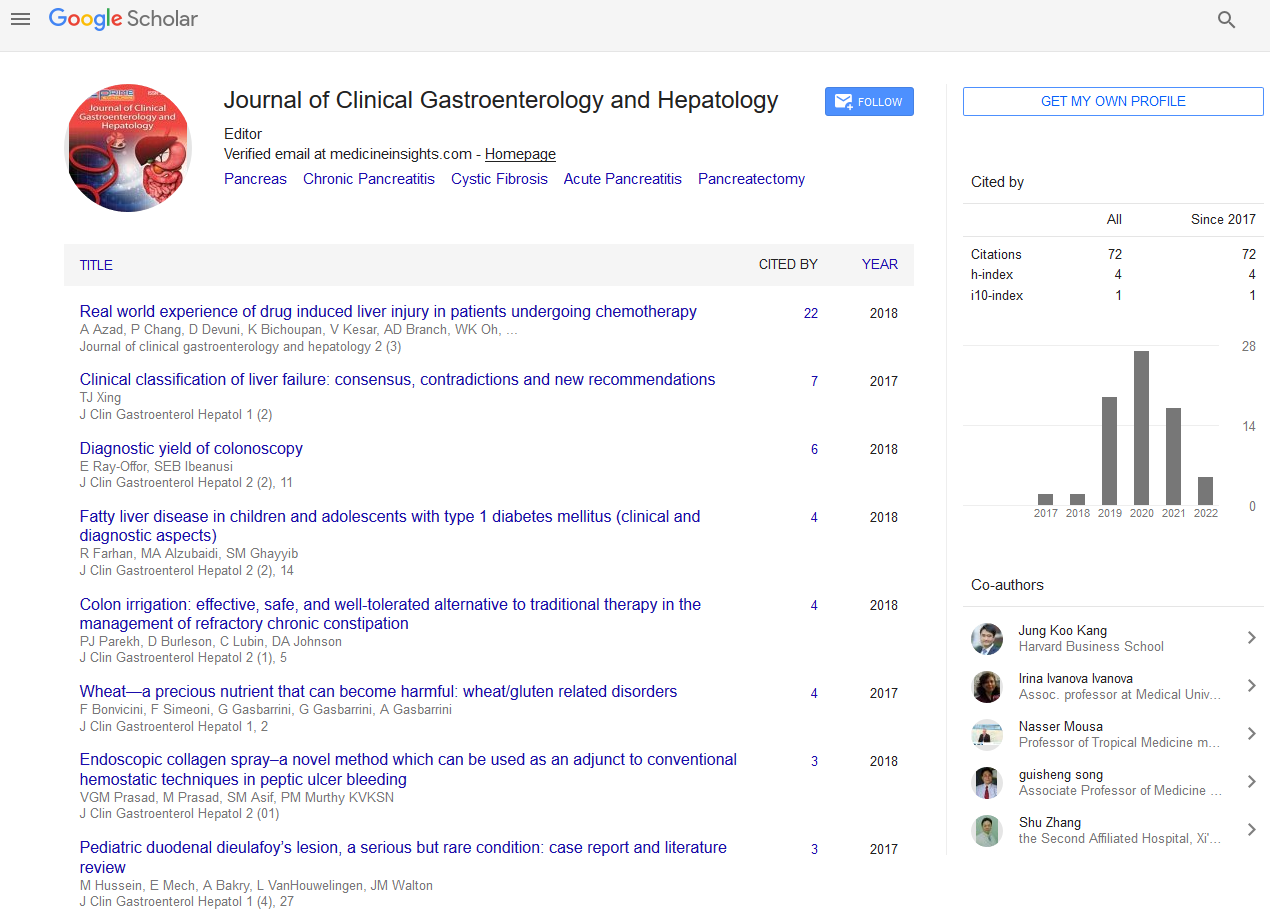Commentary - (2023) Volume 7, Issue 1
The Main Causes of Gastric Problem and how to Control it
Eoin Morgan*
Department of Gastroenterology and Hepatology, The University of Alabama at Birmingham, USA
*Correspondence:
Eoin Morgan,
Department of Gastroenterology and Hepatology, The University of Alabama at Birmingham,
USA,
Email:
Received: 02-Jan-2023, Manuscript No. IPJCGH-23-15864;
Editor assigned: 04-Jan-2023, Pre QC No. IPJCGH-23-15864 (PQ);
Reviewed: 18-Jan-2023, QC No. IPJCGH-23-15864;
Revised: 23-Jan-2023, Manuscript No. IPJCGH-23-15864 (R);
Published:
30-Jan-2023, DOI: 10.36648/2575-7733.7.1.3
Description
In today’s fast-paced world, people’s eating habits are continuously
evolving. Many people stuff themselves full of trans-fats,
sweets, and oil, which makes their stomachs feel uncomfortable!
Children, the elderly, and people of all ages might suffer
from digestive issues and other ailments. The oesophagus, or
food pipe, the stomach, and the intestines make up the gastrointestinal
tract. Food is transported by the oesophagus to
the stomach and intestines, where it is digested and broken
down to allow for the absorption of the necessary nutrients.
The majority of patients who present with stomach issues can
find relief from over-the-counter medications and lifestyle
modifications. The two most frequent issues are indigestion
and heartburn. Gas is a typical byproduct of digestion. Burping
or flatus is two ways that the body gets rid of extra gas (passing
gas). When the gas is stuck or when it is not passing through
the digestive system adequately, pain from gas may happen.
Some eating choices may also make pain worse. Frequently,
simple dietary and lifestyle adjustments can help to lessen or
manage gas and the pain it causes.
Consuming foods like beans and peas (legumes), peas, fruits,
whole grains, carbonated beverages, fibre supplements, sugar
alternatives, etc. might lead to gastric problems. Eating habits
can exacerbate stomach issues. Gastric issues can also be
brought on by certain medical conditions, including chronic
intestinal disease, small bowel bacterial overgrowth, food intolerances,
and constipation. As someone eats or drinks, air is
ingested, which produces gas. Which is primarily expelled after
burping. Gas is created, some of which is absorbed by the
bacteria, when bacteria ferment carbohydrates, fibres, starches,
and sugars that weren’t digested in the small intestine. The
anus releases the remaining portion. Even though it may be
uncomfortable or unpleasant, releasing gas is a typical component of the digestive process. An individual can urinate up to
20 times each day on average. Burping is common, especially
during or immediately after a meal.
There are numerous organs involved in the process of digestion.
One or more of them may be present in gastrointestinal
issues and illnesses. Gastrointestinal tract disorders include
appendicitis, pancreatitis, ulcers, acidity, and others. Several
illnesses, ailments, and disorders can also affect the intestines;
some of them can be fatal if not addressed right once.
The following digestive emergencies should be avoided. Bright
crimson blood in the faeces is not usually a sign of GI tract haemorrhage.
The symptoms will vary depending on where the
bleeding occurred. The blood will be partially digested and the
faeces will resemble tar or coffee grounds if it happens in the
upper intestines. It will smell strongly like rotten eggs and metal.
Bright crimson and loose bleeding indicates that it is occurring
close to the end of the intestine. Peptic ulcers, gastritis,
swollen esophageal veins from liver illness, or even malignancy
can all result in GI tract bleeding.
You do not need to see a doctor if the symptoms of a gastrointestinal
condition can be treated or controlled on your own or
with the use of medications. But, you must see a doctor if the
gastrointestinal problem symptoms are severe and interfere
with your everyday activities, or if they are accompanied by
other symptoms like chest discomfort, vomiting, heartburn, diarrhoea,
persistent constipation, weight loss, or bloody stools.
Acknowledgement
None.
Conflict of Interest
The authors declare no conflict of interest.
Citation: Morgan E (2023) The Main Causes of Gastric Problem and how to Control it. J Clin Gastroenterol Hepatol. 7:3.
Copyright: © 2023 Morgan E. This is an open-access article distributed under the terms of the Creative Commons Attribution
License, which permits unrestricted use, distribution, and reproduction in any medium, provided the original author and source
are credited.

